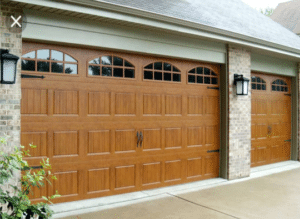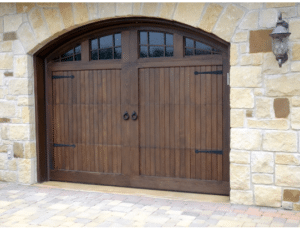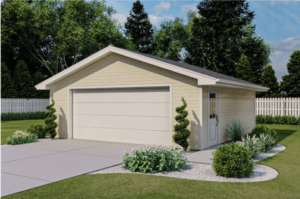Choosing the right garage door width ensures both practicality and style in your home. Whether you’re parking a single car or managing multiple vehicles, the width of your garage door affects everything from ease of access to how you organize the space.

In this guide, we’ll break down the standard garage door widths for different vehicle types and highlight some less common considerations, such as custom designs and energy efficiency. We’ll also explore how garage door width can influence insulation, technology integration, and storage options.
If you’re looking to enhance the functionality and appeal of your garage, keep reading to discover the perfect garage door width for your needs.
Standard Garage Door Widths: What Fits Your Needs?
Garage doors come in several standard sizes to suit different vehicle types and garage configurations. Understanding these sizes can help you choose a width that suits your current and future needs.
Single-Car Garage Doors: Ideal for Smaller Spaces
Single-car garage doors are generally used in homes with limited space or only needing one vehicle. Here are the typical options:
- 8 Feet Wide: This size is perfect for compact cars or standard sedans. If your garage space is tight, this width is usually sufficient. However, it might feel cramped if you have a larger vehicle or want extra maneuvering room.
- 9 Feet Wide: This option gives you more room and is better suited for larger vehicles like mid-sized SUVs or trucks. The extra foot of width makes parking easier and reduces the risk of accidentally hitting the garage walls when opening your car doors. A wider door also allows for easier access if you’re using your garage for storage or need more space for equipment alongside your car.

Double-Car Garage Doors: Convenient for Multiple Vehicles
A double-car garage door provides a practical solution for homes with two vehicles. The two most common widths are:
- 16 Feet Wide: This width can accommodate two average-sized cars, though it might be a bit snug if both vehicles are large, such as full-size SUVs or trucks. It’s a practical size for homes with limited space but allows parking of two cars.
- 18 Feet Wide: If you have larger vehicles or just want more room to move, an 18-foot-wide door provides extra clearance. This option makes it easier to park and avoids the need to be overly cautious about scraping the sides of the garage.

Uncommon Considerations for Garage Door Width
While many homeowners stick to standard garage door widths, some unique considerations can make your garage more functional and enjoyable. Here are a few uncommon factors to keep in mind:
Garage Door Arches and Custom Designs
If your home has an arched garage opening or features unique architectural designs, your garage door width might need to be customized. Arched garage doors are visually appealing but can reduce the usable width at the top of the door, especially if you drive taller vehicles.

Custom garage doors can be made to fit these unique spaces while maintaining the overall aesthetics of your home. This ensures that your garage door complements your house’s design without sacrificing practicality. A custom design can also increase your home’s curb appeal, potentially boosting its resale value if you decide to sell in the future.
Extra-wide single-car Garage Doors for Workspaces
If your garage doubles as a workspace, consider opting for an extra-wide single-car garage door. A 10—or 12-foot-wide door can provide more room to move large tools or equipment in and out without needing to install a full double-car door.

This wider option can be particularly helpful for homeowners who use their garages for projects like woodworking, car repairs, or any hobby that requires additional space. With the extra width, you won’t feel restricted when moving inside the garage. This is especially useful for mechanics or home-based businesses that rely on large equipment or frequent deliveries.
How Garage Door Width Impacts Insulation and Energy Efficiency
Garage door width can significantly affect your home’s energy efficiency. Wider doors, such as those 16 or 18 feet wide, cover a larger surface area. Without proper insulation, they can allow more heat to escape during the winter or enter during the summer, leading to higher energy bills.

Invest in insulated garage doors with high R-values (thermal resistance ratings) to combat this. Insulated doors help stabilize the temperature inside the garage, which is essential if you use the space for storage, a gym, or a workshop. A well-insulated door also helps reduce noise, making it a smart choice for homes with attached garages. If you live in an area with extreme temperatures, this could also contribute to a more comfortable environment inside your home, especially if the garage is connected to living spaces.
Technology and Garage Door Width: Integration Considerations
Smart garage door technology is becoming increasingly popular, but few homeowners realize how the width of their door can impact the type of tech they install. Here’s how:
Smart Garage Openers for Wider Doors
For larger, heavier garage doors, a more powerful opener will be needed to handle the increased weight. Wider garage doors, particularly those that are insulated, may also require an opener with more horsepower.

Smart garage door openers that connect to your smartphone allow you to control your garage from anywhere. Some models have advanced features like automatic closing and real-time alerts if the door is left open. However, ensure the opener is strong enough to handle the door’s width and weight, especially if it’s 18 feet or more. It’s important to also consider Wi-Fi strength and placement of smart devices, ensuring they can handle wider doors, especially in cases where garage door repair may be needed.
Enhanced Sensor Placement for Wide Garage Doors
Safety sensors are crucial for preventing accidents, especially in homes with children or pets. Wider doors may need additional sensors to ensure the entire opening is covered. With wider garage doors, having multiple sensors at different heights or angles can improve detection and reduce blind spots.

In larger garages or for doors wider than 16 feet, consider installing enhanced sensor systems that provide more comprehensive coverage. These systems can detect objects along the full width of the door, ensuring that it stops closing if there’s any obstruction. Installing backup battery systems for sensors can add an extra layer of protection, ensuring the door functions safely even during power outages.
Garage Layout and Storage: How Width Impacts Organization
Your garage door width affects more than parking—it also plays a big role in how you organize and use the rest of the space. Let’s examine how width can impact storage and layout.
Vertical Storage Solutions for Wider Doors
Wider garage doors offer more flexibility when it comes to organizing the space. They allow you to install tall shelving units, wall-mounted storage systems, and even overhead racks without worrying about obstructing the door’s operation.
For example, if you have a double-car garage door 18 feet wide, you can more easily install ceiling-mounted storage for items like kayaks, bicycles, or seasonal decorations. This makes better use of vertical space and keeps your garage floor clear. The extra width also allows you to dedicate one side of the garage to vehicle parking and the other to organized storage, creating a well-balanced and clutter-free environment.
Creating a Multipurpose Garage with a Wider Door
Many homeowners use their garages for more than just parking cars. Wider doors make it easier to transform your garage into a multifunctional space, such as a home gym, workshop, or entertainment area.
For instance, a garage with an 18- or 20-foot-wide door can accommodate larger furniture or equipment, making it ideal for setting up different zones within the garage. Retractable screens are also popular for those who want to convert part of their garage into an outdoor living space while keeping bugs out. This setup can be perfect for hosting parties or gatherings, creating a hybrid indoor-outdoor area.
Custom Garage Door Widths for Detached Garages and Carports
Detached garages and carports often require consideration of widths that are different from those of attached garages. Here’s what you should think about:
Wider Doors for Detached Garages
Detached garages are often used for more than just parking, serving as workshops, storage areas, or even guest quarters. In these cases, you might want a garage door wider than the standard 16 or 18 feet. Opting for a 20-foot or wider garage door can provide the flexibility needed for various uses, especially if parking larger vehicles or frequently moving equipment in and out.

A detached garage with a wider door also makes creating a more organized storage system easier. You can include wider storage racks, larger workbenches, and additional vehicles, like motorcycles or ATVs. Detached garages with wider doors are also great for outdoor enthusiasts who need space for larger recreational items, such as boats or campers.
Adding Garage Doors to Carports
Carports are generally open, but adding a garage door can enhance security and protect your vehicles from the elements. The width of the door should match the carport’s structure and the number of vehicles you intend to park.

A double-car door, typically 16 or 18 feet wide, can be a great addition to carports designed for two vehicles. Wider carport doors can also make the space more versatile, allowing you to convert it into a semi-enclosed garage in the future. This adds value to your property and provides more flexibility for using the space over time.
Additional Considerations: Door Height and Width Together
It’s also important to consider how the height and width of your garage door interact. If you’re installing a wider door, you may need additional height to accommodate larger vehicles or storage needs. For example, RV owners often require both wider and taller garage doors. Custom solutions that combine non-standard heights and widths can ensure your garage is ready for any vehicle or purpose.
Frequently Asked Questions (FAQs) about Garage Door Width
How do I choose a garage size?
Choosing a garage size depends on the number of vehicles you own and how much additional storage or workspace you need. A garage about 12 feet by 20 feet works well for a single car. For two cars, opt for at least 20 by 20 feet, and consider a larger size if you need extra room for tools or storage.
Is there a minimum size for a garage?
Yes, the minimum size for a single-car garage is generally 10 feet wide by 18 feet deep. However, to comfortably park and open doors, 12 feet by 20 feet is recommended. For a two-car garage, the minimum width is around 18 feet, but 20 feet provides a more practical space.
How wide is a standard door?
A standard single garage door is usually 8 to 9 feet wide, while a double garage door is typically 16 feet wide. These dimensions are designed to accommodate most vehicles. However, if you have a larger vehicle, you may consider custom widths for ease of entry and exit.
What is the universal size of a garage door?
The most common size for a single garage door is 9 feet wide by 7 feet high, and for a double garage door, 16 feet wide by 7 feet high. These sizes fit most cars and trucks, but custom sizes can be made for special requirements like larger vehicles or additional storage.
How wide is the average car?
The average width of a car is about 6 to 6.5 feet, including the mirrors. Compact cars tend to be narrower, while larger vehicles like trucks and SUVs can reach up to 7 feet wide. When planning a garage, ensure sufficient room for comfortably opening car doors.
Conclusion
Choosing the perfect new garage door width goes beyond simply fitting your vehicle into the garage. It impacts everything from how you organize your garage to its energy efficiency and even the types of smart technology you can use.
By considering your current needs and future possibilities, you can ensure your garage door offers functionality, safety, and style. Whether you go for a standard size or a custom width, assessing your garage’s role in your home will help you make the right choice.
End Note
At Tarrant County Door & Gate, we specialize in helping homeowners choose the perfect garage door width that fits both their needs and their home’s design. From garage door service, repair, replacement, and installation, to broken spring repair, keypads, remote controls, and emergency services, we’ve got you covered. Serving the Tarrant County area, including Keller, Southlake, Colleyville, Grapevine, Bedford, Hurst, Fort Worth, and Haslet, our expert team ensures your garage door is not only functional but enhances your home’s curb appeal.
For more information about our services, visit us at Tarrant County Door & Gate. Learn more about our team here, or explore our drive gate services here. Want to see our work? Check out our gallery here. Stay updated with our latest insights on our blog here, or get in touch with us directly here. We’re here to make sure your garage door is the perfect fit!

